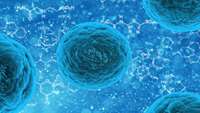Researchers create human airway stem cells from patients' cells
For the first time, researchers have successfully created airway basal stem cells in vitro from induced pluripotent stem cells by reprogramming blood cells taken from patients.
New CRISPR technology helps revolutionize gene therapy
Researchers from the National Institutes of Health (MD, USA) and Harvard University (MA, USA) have used second-generation CRISPR gene-editing technology termed ‘base editing’ to revolutionize gene therapy in order to tackle a genetic disorder called Hutchinson–Gilford progeria syndrome (HGPS).
The final phase of the Comprehensive Stem Cell and Regenerative Medicine Center of Tehran University of Medical Sciences was inaugurated.
Iranian-made products in the field of cancer treatment will be marketed and the country will not need to import
Synthetic biology and machine learning speed the creation of lab-grown livers
Researchers at the University of Pittsburgh School of Medicine have combined synthetic biology with a machine-learning algorithm to create human liver organoids with blood- and bile-handling systems. When implanted into mice with failing livers, the lab-grown replacement livers extended life.
Researchers identify gene responsible for cellular aging
Cellular reprogramming can reverse the aging that leads to a decline in the activities and functions of mesenchymal stem/stromal cells (MSCs). This is something that scientists have known for a while. But what they had not figured out is which molecular mechanisms are responsible for this reversal.
Scientists have built a fully functioning thymus from human cells
The thymus is the organ of the chest where T-lymphocytes mature, which play a vital role in the immune system. In an experimental study published in Nature Communications, the researchers reconstructed the thymus using stem cells taken from patients who had to have the organ removed during surgery.
Stem cell transplant benefits older adults with MDS
Among older patients with myelodysplastic syndrome (MDS), survival rates are better for those undergoing allogeneic hematopoietic cell transplantation (HCT), according to a study presented at the annual meeting of the American Society of Hematology, held virtually from Dec. 5 to 8.
CRISPR CTX001 Clinical Trial: Promising Results in Sickle Cell Patients
Sickle cell anemia and beta-thalassemia are serious genetic blood disorders, caused by mutations in the gene that produces beta-globin, a component of hemoglobin.
3D-printed device developed for directed stem cell differentiation
Researchers from the Singapore University of Technology and Design (SUTD) have 3D-printed micro-scaled devices to enhance the production of cardiomyocytes from stem cells.
Elevated biomarker for blood vessel damage found in all children with SARS-CoV-2
Researchers at Children's Hospital of Philadelphia (CHOP) have found elevated levels of a biomarker related to blood vessel damage in children with SARS-CoV-2 infection, even if the children had minimal or no symptoms of COVID-19.












